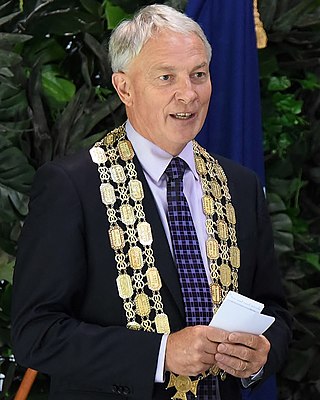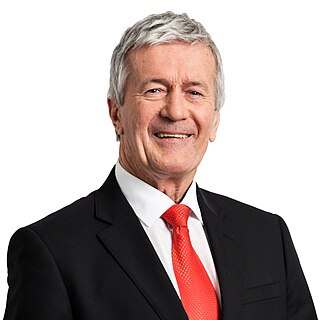The New Zealand Labour Party, also known simply as Labour, is a centre-left political party in New Zealand. The party's platform programme describes its founding principle as democratic socialism, while observers describe Labour as social-democratic and pragmatic in practice. The party participates in the international Progressive Alliance. It is one of two major political parties in New Zealand, alongside its traditional rival, the National Party.

Sir Michael John Cullen was a New Zealand politician. He served as the 16th deputy prime minister of New Zealand, also as the minister of Finance, minister of Tertiary Education, and attorney-general. He was the deputy leader of the Labour Party from 1996 until November 2008, when he resigned following a defeat in the general election. He resigned from Parliament in April 2009, to become the deputy chairman of New Zealand Post from 1 November 2009 and chairman from 1 November 2010 until leaving the role in 2016. On 6 March 2020 he announced that he had resigned from the Lakes and Bay of Plenty district health boards, respectively. At the same time he also announced that he had been diagnosed with stage 4 small-cell lung cancer, which had also spread to his liver.

Philip Bruce Goff is a New Zealand politician and diplomat. He currently serves as High Commissioner of New Zealand to the United Kingdom since 2023. He was a member of the New Zealand Parliament from 1981 to 1990 and again from 1993 to 2016. He served as leader of the Labour Party and leader of the Opposition between 11 November 2008 and 13 December 2011.

Dame Annette Faye King is a former New Zealand politician. She served as Deputy Leader of the New Zealand Labour Party and Deputy Leader of the Opposition from 2008 to 2011, and from 2014 until 1 March 2017. She was a Cabinet Minister in the Fourth and Fifth Labour Governments, and was the MP for the Rongotai electorate in Wellington from 1996 to 2017.

David Richard Cunliffe is a New Zealand management consultant and former politician who was Leader of the New Zealand Labour Party and Leader of the Opposition from September 2013 to September 2014. He was Member of Parliament (MP) for Titirangi and then New Lynn for the Labour Party between 1999 and 2017. He served as the Minister of Health, Minister for Communications and Information Technology and Minister of Immigration for the Fifth Labour Government of New Zealand from October 2007 until November 2008.

Damien Peter O'Connor is a New Zealand Labour Party politician who served as Minister of Agriculture, Minister for Biosecurity, Minister for Trade and Export Growth, Minister for Land Information and Minister for Rural Communities in the Sixth Labour Government. He previously served as a cabinet minister in the Fifth Labour Government. He had been a member of Parliament since 1993 and represented the West Coast-Tasman electorate. He is now on the Labour list.

David William Parker is a New Zealand Labour Party politician who served as Attorney-General, Minister for the Environment, Minister of Transport and Associate Minister of Finance in the Sixth Labour Government. He previously served as a Cabinet Minister in the Fifth Labour Government, Deputy Leader of the New Zealand Labour Party and Deputy Leader of the Opposition from September 2013 to September 2014, and as interim Leader of the Labour Party from September to November 2014. He represented the Otago electorate at the 47th Parliament and has since served as a list MP.

David Francis Caygill is a former New Zealand politician. Caygill was born and raised in Christchurch. He entered politics in 1971 as Christchurch's youngest city councillor at the age of 22. He served as a Member of Parliament (MP) from 1978 to 1996, representing the Labour Party. A supporter of Rogernomics, he served as Minister of Finance between 1988 and 1990. From 2010 to 2019, he was one of the government-appointed commissioners at Environment Canterbury.

Koro Tainui Wētere was a New Zealand politician. He was an MP from 1969 to 1996, representing the Labour Party. He served as Minister of Māori Affairs in the Fourth Labour Government (1984–1990).

Grant Murray Robertson is a retired New Zealand politician and member of the Labour Party who served as the Minister of Finance from 2017 to 2023, as Minister of Foreign Affairs in November 2023, and as the 19th Deputy Prime Minister of New Zealand from 2020 to 2023. He was the member of Parliament (MP) for Wellington Central from 2008 to 2023.

Helen Elizabeth Clark is a New Zealand politician who served as the 37th prime minister of New Zealand from 1999 to 2008, and was the administrator of the United Nations Development Programme from 2009 to 2017. She was New Zealand's fifth-longest-serving prime minister, and the second woman to hold that office.
The 2011 New Zealand Labour Party leadership election was held on 13 December 2011 to choose the thirteenth Leader of the New Zealand Labour Party. A Deputy Leader and a senior and a junior whip were also elected. Following the Labour Party's loss in the 2011 general election, leader Phil Goff and deputy leader Annette King resigned, prompting the leadership election, which was conducted as a secret ballot of the Labour caucus.

The 2014 New Zealand Labour Party leadership election was held to choose the Leader of the Labour Party. Andrew Little won the election and became leader of the party.
Andrew Little assembled a shadow cabinet after he was elected Leader of the Labour Party in New Zealand. He composed this of individuals who acted for the party as spokespeople in assigned roles while he was Leader of the Opposition (2014–17). As the Labour Party formed the largest party not in government, this Frontbench team was as a result the Official Opposition of the New Zealand House of Representatives.

The 1954 New Zealand Labour Party leadership election was held on 23 June 1954 to determine the future leadership of the New Zealand Labour Party. The election was won by Hutt MP Walter Nash, the incumbent leader.
The 1993 New Zealand Labour Party leadership election was held to determine the leadership of the New Zealand Labour Party. The leadership was won by Mount Albert MP Helen Clark, who had been Deputy Leader of the party since 1989.

The 1996 New Zealand Labour Party leadership election was intended to determine the future leadership of the New Zealand Labour Party. The leadership was retained by Mount Albert MP Helen Clark, who was the incumbent leader.
The 1990 New Zealand Labour Party leadership election was held on 4 September to determine the leadership of the New Zealand Labour Party. The leadership was won by Christchurch North MP Mike Moore.
New Zealand political leader Helen Clark assembled a "shadow cabinet" system amongst the Labour caucus following her election to the position of Leader of the Opposition in 1993. She composed this of individuals who acted for the party as spokespeople in assigned roles while she was Leader of the Opposition (1993–99).

The 1989 New Zealand Labour Party leadership election was held to determine the leadership of the New Zealand Labour Party. The leadership was won by Christchurch Central MP and incumbent deputy leader Geoffrey Palmer.














